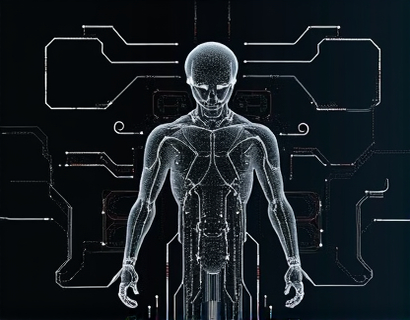AI Certification Innovations: Transforming Skill Validation and Career Advancement in the Digital Age
The digital age has ushered in a new era of technological advancements, particularly in artificial intelligence (AI), which continues to reshape industries and job markets worldwide. As AI technologies evolve, the demand for skilled professionals who can effectively leverage these tools has surged. In this context, AI certification has emerged as a pivotal mechanism for validating expertise and enhancing career prospects. This article delves into the innovations in AI certification, exploring how these credentials are transforming skill validation and career advancement.
Traditionally, professional certifications have played a crucial role in demonstrating competence and commitment to a particular field. However, with the rapid pace of change in AI, conventional certifications often struggle to keep up, leading to a gap between the skills employers seek and the qualifications candidates possess. AI certification platforms are addressing this challenge by introducing cutting-edge solutions that not only validate skills through practical tasks but also provide educational milestones to guide learners.
Personalized Learning Paths
One of the key innovations in AI certification is the offer of personalized learning paths. These platforms utilize advanced algorithms to assess a learner's current skill level and create a tailored curriculum that addresses specific gaps. This approach ensures that individuals receive a customized education that aligns with their career goals and existing knowledge base. By focusing on areas where improvement is needed, learners can efficiently build a robust skill set that is directly applicable to real-world scenarios.
For instance, a beginner in AI might start with foundational courses covering the basics of machine learning and data analysis. As they progress, the platform identifies areas such as deep learning or natural language processing where further expertise is required. This dynamic adjustment not only accelerates learning but also ensures that the skills acquired are relevant and in demand in the current job market.
Task-Based Certification
Traditional certifications often rely on theoretical exams, which may not fully capture a candidate's practical abilities. In contrast, task-based certification offers a more comprehensive assessment by requiring learners to complete real-world tasks and projects. This approach provides a tangible demonstration of skills, making it easier for employers to evaluate a candidate's capabilities.
On these platforms, learners engage in hands-on projects that simulate professional environments. For example, a learner might be tasked with building a machine learning model from scratch, including data preprocessing, model training, and evaluation. Upon successful completion, they receive a certificate that specifically highlights the tasks they have mastered. This not only validates their skills but also showcases their ability to apply knowledge in practical settings.
Continuous Learning and Upskilling
The field of AI is constantly evolving, with new algorithms, tools, and applications emerging regularly. To stay competitive, professionals must commit to continuous learning and upskilling. AI certification platforms address this need by offering ongoing education and certification updates. These platforms regularly introduce new courses and certifications that reflect the latest trends and advancements in AI.
For example, a certification in AI ethics or explainable AI might become increasingly relevant as these topics gain prominence. By providing timely and relevant content, these platforms ensure that certified professionals remain at the forefront of their field. This commitment to continuous education not only enhances individual skill sets but also contributes to the overall advancement of the AI industry.
Enhanced Professional Credibility
In a job market where AI skills are highly sought after, having a recognized certification can significantly boost professional credibility. Employers often view certified professionals as more reliable and competent, which can lead to better job opportunities and career advancement. The task-based nature of these certifications further enhances credibility, as they provide concrete evidence of a candidate's ability to apply their knowledge effectively.
Moreover, these certifications are often industry-recognized, meaning they carry weight across different organizations and regions. This broad recognition increases the versatility of the credential, allowing professionals to seek opportunities in various sectors and locations. For instance, a certification in AI project management can be valuable whether one is working in finance, healthcare, or technology.
Career Development and Advancement
AI certification is not just about validating current skills; it is also a powerful tool for career development and advancement. By acquiring these credentials, professionals can open doors to higher-paying positions, leadership roles, and specialized opportunities that were previously out of reach. The certifications serve as a stepping stone, helping individuals navigate the complex landscape of the AI job market.
For example, a data scientist with a certification in advanced machine learning techniques may find themselves eligible for senior roles or specialized projects that require deep expertise. Similarly, a software engineer who completes a certification in AI-driven automation can transition into roles focused on optimizing business processes through AI solutions. These certifications provide the necessary credentials to demonstrate readiness for such advanced positions.
Supporting Educational Institutions
The rise of AI certification has also had a positive impact on educational institutions. Universities and training centers are integrating AI-focused programs and certifications into their curricula, ensuring that students graduate with relevant skills. This alignment between education and industry needs helps bridge the skills gap and prepares the next generation of AI professionals.
Furthermore, these institutions often partner with AI certification platforms to offer recognized credentials to their students. This collaboration not only enhances the value of the education provided but also increases the employability of graduates. For instance, a university might offer a bachelor's program in AI with a specialization that leads to a certification from a leading AI accreditation platform. This combined approach ensures that students are well-prepared for the job market upon graduation.
Challenges and Considerations
While AI certification offers numerous benefits, there are also challenges and considerations to keep in mind. One major challenge is ensuring the quality and credibility of certifications. With the proliferation of certification providers, it is crucial for learners to choose reputable platforms that adhere to high standards. This involves verifying the accreditation body, reviewing curriculum content, and checking the reputation within the industry.
Another consideration is the cost associated with obtaining these certifications. While the investment can lead to significant career benefits, it is essential for individuals to weigh the costs against the potential returns. Some platforms offer financial aid or payment plans to make these opportunities more accessible, but learners should still conduct thorough research before committing.
Future Trends in AI Certification
Looking ahead, the future of AI certification is likely to see further innovations and expansions. One trend is the integration of blockchain technology to create immutable and tamper-proof certificates. This ensures that credentials are verifiable and secure, adding an extra layer of trust and reliability. Additionally, the use of AI in the certification process itself is becoming more prevalent, with platforms employing AI to personalize learning experiences and assess candidate abilities more accurately.
There is also a growing emphasis on interdisciplinary certifications that combine AI with other fields such as healthcare, finance, and education. These hybrid certifications prepare professionals to tackle complex, multi-faceted challenges that require a broad skill set. For example, a certification in AI for healthcare applications can equip professionals with the tools to develop innovative solutions in medical research and patient care.
Conclusion
AI certification innovations are revolutionizing the way skills are validated and careers are advanced in the digital age. By offering personalized learning paths, task-based assessments, and continuous education, these platforms provide comprehensive support for professionals looking to thrive in the AI landscape. The enhanced credibility and career opportunities offered by these certifications make them an invaluable asset for anyone seeking to excel in the tech industry. As the field continues to evolve, staying informed and adaptable will be key to leveraging these certifications to their full potential.










































